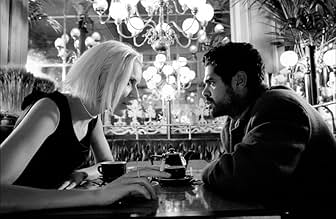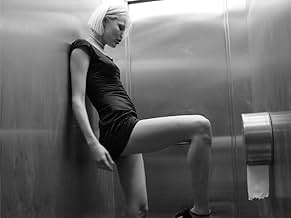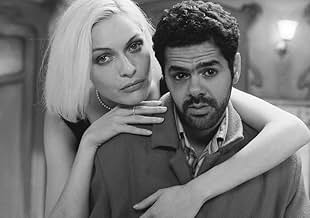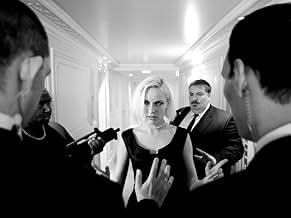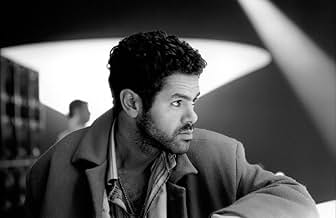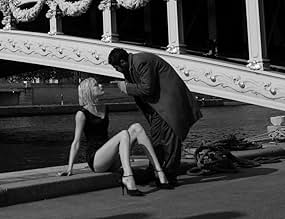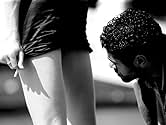VALUTAZIONE IMDb
7,0/10
36.741
LA TUA VALUTAZIONE
Una donna molto affascinante aiuta un maldestro artista della truffa a rimettersi in piedi.Una donna molto affascinante aiuta un maldestro artista della truffa a rimettersi in piedi.Una donna molto affascinante aiuta un maldestro artista della truffa a rimettersi in piedi.
- Regia
- Sceneggiatura
- Star
Franck-Olivier Bonnet
- Le dernier client
- (as Franck Olivier Bonnet)
Jean-Marc Montalto
- Le réceptionniste
- (as Jean-Marco Montalto)
Recensioni in evidenza
Angel-A is an easy film to knock. Superficially, there isn't a great deal to endear it to any particular type of audience. For example, there's barely any action, no sex or nudity, there are no big Hollywood stars, it's not sufficiently intellectual to be an 'art-house movie' (despite being black & white!) and, although it has amusing moments, it's hardly a comedy. In addition, the film is only focused on the two main characters and, even then, it's only really about one of them. The remaining participants are (quite deliberately it appears) straightforward stereotypes who allow the simple story to progress. The quality of acting from Rie Rasmussen seems far from impressive but, to be fair, she's not speaking in her native language. Mind you, her awkward portrayal of the titular character seems to work well and she certainly stands out as a 'fish out of water'.
But despite the film's potential short-comings, there are three saving graces that transform Angel-A from a rather average 7 to a brilliant 9 in my eyes: the breathtaking cinematography (thank you Luc Besson), the magnificent casting (Jamel Debbouze is perfect as André) and the heart- warming gentle story (which stayed with me long after the film had finished). In fact, I would go so far as to say that Angel-A could leave you examining your own life and wondering when was the last time you stopped to 'respire and regard' the beautiful world around you and consider how the way you feel about yourself might well have a direct impact on how others treat you.
However, Angel-A is one of those films that you have to be in the right mood to watch. If you don't allow yourself to relax and be drawn into the fairytale, the story can easily fall flat. You also have to give it a chance to get started; the fast-paced dialogue at the beginning makes it hard to watch the pictures at the same time as reading the words (unless you're French of course!). But once Angela enters the frame, the story takes off on a stunningly gorgeous wander around Paris and the way that the tale gently unfolds in the second half of the film is wonderfully touching. There are many moments of outstanding beauty and even the superficially simplistic long-shots of Angela & André crossing the Seine have a mysterious magical quality about them. Actually, the whole film feels slightly unreal; this is partly down to the subject matter but also to the way it was filmed in an almost-empty Paris at odd times of the day.
So, in summary, I love Angel-A. It's one of those films you can watch again and again quite happily and find new insights from each viewing. There are so many scenes that quickly become favourite moments as you watch it multiple times. The contrast between the giant Nordic goddess and the shifty little North-African seems to work brilliantly and the backdrop of a beautiful black & white Paris with incredible lighting more than makes up for a few minor flaws. 9/10
But despite the film's potential short-comings, there are three saving graces that transform Angel-A from a rather average 7 to a brilliant 9 in my eyes: the breathtaking cinematography (thank you Luc Besson), the magnificent casting (Jamel Debbouze is perfect as André) and the heart- warming gentle story (which stayed with me long after the film had finished). In fact, I would go so far as to say that Angel-A could leave you examining your own life and wondering when was the last time you stopped to 'respire and regard' the beautiful world around you and consider how the way you feel about yourself might well have a direct impact on how others treat you.
However, Angel-A is one of those films that you have to be in the right mood to watch. If you don't allow yourself to relax and be drawn into the fairytale, the story can easily fall flat. You also have to give it a chance to get started; the fast-paced dialogue at the beginning makes it hard to watch the pictures at the same time as reading the words (unless you're French of course!). But once Angela enters the frame, the story takes off on a stunningly gorgeous wander around Paris and the way that the tale gently unfolds in the second half of the film is wonderfully touching. There are many moments of outstanding beauty and even the superficially simplistic long-shots of Angela & André crossing the Seine have a mysterious magical quality about them. Actually, the whole film feels slightly unreal; this is partly down to the subject matter but also to the way it was filmed in an almost-empty Paris at odd times of the day.
So, in summary, I love Angel-A. It's one of those films you can watch again and again quite happily and find new insights from each viewing. There are so many scenes that quickly become favourite moments as you watch it multiple times. The contrast between the giant Nordic goddess and the shifty little North-African seems to work brilliantly and the backdrop of a beautiful black & white Paris with incredible lighting more than makes up for a few minor flaws. 9/10
A sweet and unusual love story. Impossibly mismatched couple that work really well. Beautifully filmed and directed as one would expect from Besson. Definitely a piece of retro noir art but with style over substance.
Well worth the watch for a movie with a difference.
Well worth the watch for a movie with a difference.
This film made me shed a tear or two (but then I am an emotional soul!). The comedic aspects, such as the total physical difference between the leads and the strength of the Angela were well placed. The reason for Angela coming into the life of Andre and her true identity could have been very tactlessly handled and cheesy in a Disney kind of way, but Besson made it seem as natural as catching a bus. Subtitles normally irritate me, but I didn't seem to notice them in this film. Paris in black and white is also very evocative and the filming was great in my opinion. I would recommend this film to anyone who fancies a fairly short film that makes you think about whether you appreciate your inner beauty and qualities.
The last time Luc Besson directed a movie, was back in 1999. The last six years he occupied himself with his production-company EuropaCorp and by writing a lot of screenplays. Now he's back with his 9th feature film, ANGEL-A. This time no gunfights, car-chases or explosions. Nope, this time the man brings us, of all things, a romantic comedy. The movie is completely shot in Paris and seems to be one of the most secret projects of French cinema. Honestly, I can't see why, except maybe for a nice plot-twist which is presented to us halfway through the movie and not, as usual, near the end.
The plot (don't worry, no spoilers): André is a regular swindler. He lies and cheats all the time and owes money to almost every criminal in Paris. After being beaten and threatened for the umpteenth time, he decides to kill himself by jumping off a bridge. On the verge of committing this act of despair, while standing on a bridge, he looks to the left and sees a girl about to do the same thing. When she jumps, he jumps after her and saves her from drowning. She's so thankful that she offers to do anything he wants while constantly remaining at his side. Suprisedly, she turns out to be a real life-saver by finding a lot of dubious ways to earn money and pay off André's debts. After a while André wants to know why she's doing all these things for him and is curious about her past...
Jamel Debbouze (you might know him as the slightly retarded grocer's assistant in LE FABULEUX DESTIN D'AMÉLIE POULAIN) is particularly good as the nervous André. The Dannish Rie Rasmussen, a sexy blond goddess with legs that go all the way, takes a little more time to convince as Angela. However, there is a certain chemistry between the two of them. The other characters are merely caricatured portraits of criminals and gangsters.
The story is rather straightforward and relies a lot on funny situations and dialogues. A lot of talking is being done and I must say most of the lines are well-written. Near the end of the movie, unfortunately, Luc Besson goes way over-the-top, making the movie lose a lot of credibility. But then again, it just might be possible that the end could be interpreted in two different ways. And that makes me suspect that Besson likes to play it safe by trying to please as many viewers as possible.
Anyway, a very important reason to watch this movie is the atmospheric black & white-photography by cinematographer Thierry Arbogast, who also worked on Besson's previous films. Paris, during autumn, is beautifully transferred to the screen with well-balanced lighting. The movie also has some impressive shots of 'la Tour Eiffel', a cathedral in 'le XVe arrondissement' and the many bridges to be found in Paris.
Most likely ANGEL-A will have as many defenders as adversaries, not necessarily to be divided in Besson-fans and not-fans respectively. But both parties will have to admit Besson had the guts to try something different. So let the box-office decide whether this genre-effort is successful or not.
The plot (don't worry, no spoilers): André is a regular swindler. He lies and cheats all the time and owes money to almost every criminal in Paris. After being beaten and threatened for the umpteenth time, he decides to kill himself by jumping off a bridge. On the verge of committing this act of despair, while standing on a bridge, he looks to the left and sees a girl about to do the same thing. When she jumps, he jumps after her and saves her from drowning. She's so thankful that she offers to do anything he wants while constantly remaining at his side. Suprisedly, she turns out to be a real life-saver by finding a lot of dubious ways to earn money and pay off André's debts. After a while André wants to know why she's doing all these things for him and is curious about her past...
Jamel Debbouze (you might know him as the slightly retarded grocer's assistant in LE FABULEUX DESTIN D'AMÉLIE POULAIN) is particularly good as the nervous André. The Dannish Rie Rasmussen, a sexy blond goddess with legs that go all the way, takes a little more time to convince as Angela. However, there is a certain chemistry between the two of them. The other characters are merely caricatured portraits of criminals and gangsters.
The story is rather straightforward and relies a lot on funny situations and dialogues. A lot of talking is being done and I must say most of the lines are well-written. Near the end of the movie, unfortunately, Luc Besson goes way over-the-top, making the movie lose a lot of credibility. But then again, it just might be possible that the end could be interpreted in two different ways. And that makes me suspect that Besson likes to play it safe by trying to please as many viewers as possible.
Anyway, a very important reason to watch this movie is the atmospheric black & white-photography by cinematographer Thierry Arbogast, who also worked on Besson's previous films. Paris, during autumn, is beautifully transferred to the screen with well-balanced lighting. The movie also has some impressive shots of 'la Tour Eiffel', a cathedral in 'le XVe arrondissement' and the many bridges to be found in Paris.
Most likely ANGEL-A will have as many defenders as adversaries, not necessarily to be divided in Besson-fans and not-fans respectively. But both parties will have to admit Besson had the guts to try something different. So let the box-office decide whether this genre-effort is successful or not.
Angel-a can be described as a romantic comedy, as a movie about angels and as one about therapy. As a romantic comedy it is a good and charming film, which stands far away from the omnipresent and boring Hollywood romantic comedies. As a movie about angels it is not convincing, and the best it can be said in its favour is that the movie is an heterodox rendering of angels, half divine and half too-human.
But the best use that can be given to this film is to adopt it as a manual of cognitive or rational-emotive therapy. A well respected field within psychology, cognitive therapy looks for transforming distorted thinking, which it is said, affects the mood, the behaviour and the life of people. That is simply what Angel-a does with Andre, giving him reasons to love himself, and teaching him techniques to change the way he thinks or speaks of himself. If we go to cinema some times to enjoy ourselves and some times to bring something to our lives, this movie allows us to do both. Art and cinema have also ethical consequences -in the sense of Foucault- giving us clues about how to live our lives better. In this sense the best description of Angel-a is given above by Elizabeth Arthur when she says that this is "a film about learning to love yourself".
Only one question remains: Why a director like Besson, who has been making movies about violence, decides to read about cognitive therapy and bring angels to earth and make a film like this?
But the best use that can be given to this film is to adopt it as a manual of cognitive or rational-emotive therapy. A well respected field within psychology, cognitive therapy looks for transforming distorted thinking, which it is said, affects the mood, the behaviour and the life of people. That is simply what Angel-a does with Andre, giving him reasons to love himself, and teaching him techniques to change the way he thinks or speaks of himself. If we go to cinema some times to enjoy ourselves and some times to bring something to our lives, this movie allows us to do both. Art and cinema have also ethical consequences -in the sense of Foucault- giving us clues about how to live our lives better. In this sense the best description of Angel-a is given above by Elizabeth Arthur when she says that this is "a film about learning to love yourself".
Only one question remains: Why a director like Besson, who has been making movies about violence, decides to read about cognitive therapy and bring angels to earth and make a film like this?
Lo sapevi?
- QuizIn real life, Jamel Debbouze lost the use of his right arm in an accident in 1990. This is why his character in the film keeps his hand in his pocket throughout.
- BlooperWhen Andre climbs over the railing of the bridge, he's coat is fastened by a single button. Suddenly, when he watches the outgoing police car, there are more buttons fastened.
- Curiosità sui creditiThe EuropaCorp logo is in black-and-white, fitting the film.
- ConnessioniFeatured in The Films of Luc Besson (2016)
- Colonne sonoreCrossroads
Performed by Eat
I più visti
Accedi per valutare e creare un elenco di titoli salvati per ottenere consigli personalizzati
- How long is Angel-A?Powered by Alexa
Dettagli
- Data di uscita
- Paese di origine
- Siti ufficiali
- Lingue
- Celebre anche come
- Thiên Thần A
- Luoghi delle riprese
- Aziende produttrici
- Vedi altri crediti dell’azienda su IMDbPro
Botteghino
- Budget
- 15.000.000 € (previsto)
- Lordo Stati Uniti e Canada
- 202.647 USD
- Fine settimana di apertura Stati Uniti e Canada
- 29.727 USD
- 27 mag 2007
- Lordo in tutto il mondo
- 9.995.168 USD
- Tempo di esecuzione1 ora 31 minuti
- Colore
- Mix di suoni
- Proporzioni
- 2.35 : 1
Contribuisci a questa pagina
Suggerisci una modifica o aggiungi i contenuti mancanti


